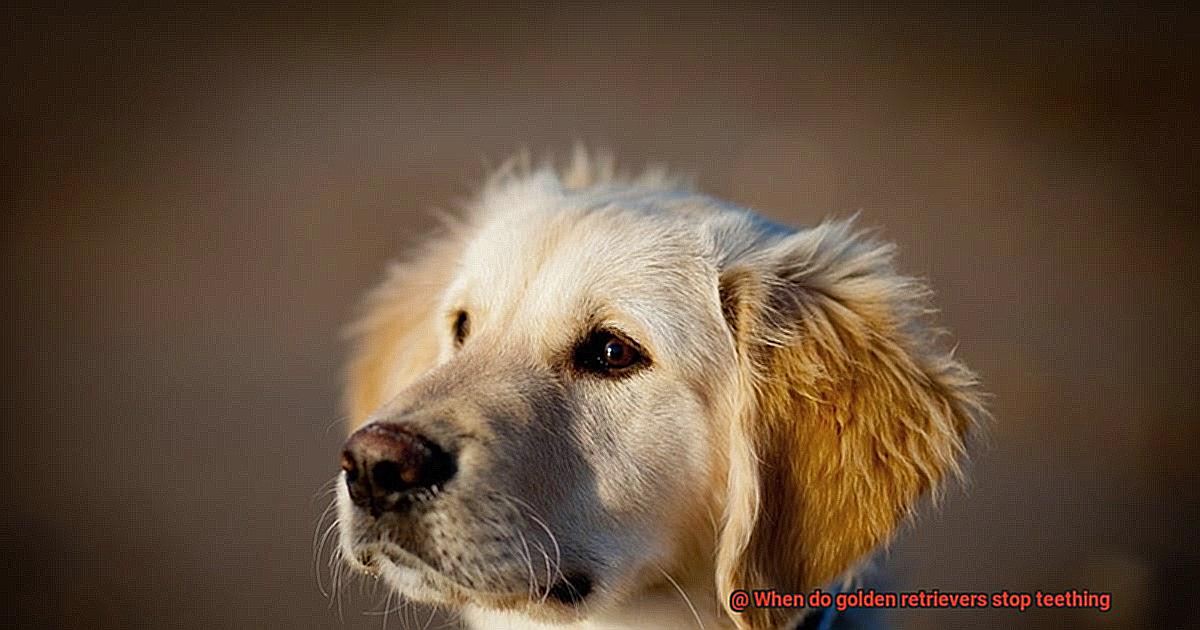Golden Retrievers are undoubtedly some of the most lovable and adorable dog breeds around. With their soft, fluffy fur, affectionate nature, and penchant for snuggles, they make the perfect companion for anyone looking for a furry friend. However, just like human babies, these cuddly canines go through a teething stage that can be quite challenging for both them and their owners. So when do Golden Retrievers stop teething, and how can you help them through it?
The answer isn’t as simple as you might think. Typically, Golden Retrievers start teething at around three months old, and the process usually lasts anywhere from four to eight months. However, several other factors can impact this timeframe – things like genetics, diet, environment, and overall health all play a role in how long it takes for your Golden Retriever to stop teething.
In this article, we’ll dive into everything you need to know about when Golden Retrievers stop teething. We’ll explore the different stages of teething and what to expect during each phase. We’ll also provide some helpful tips on how to soothe your pup’s sore gums and keep them comfortable throughout the process.
So whether you’re a first-time pet owner or a seasoned pro looking to learn more about your furry friend’s development, buckle up and get ready to discover all there is to know about when Golden Retrievers stop teething.
Teething Process in Golden Retrievers
Contents
Golden retrievers are some of the most beloved family pets, with their friendly personalities and adorable looks. However, like all puppies, they go through the teething process, which can be a challenging time for both the pup and the owner. In this post, we’ll delve into the teething process for golden retrievers and explore ways to make it easier for your furry friend.

The Teething Process
The teething process for golden retrievers typically begins when they are around three to four months old. During this time, you may notice your puppy becoming more restless and chewing on anything in sight. This is because their baby teeth are starting to fall out, and their adult teeth are growing in.
The teething process can be uncomfortable for your pup, so it’s important to provide them with plenty of toys and chews specifically designed for teething puppies. These toys are made out of softer materials that are gentle on a puppy’s mouth but still provide them with the satisfaction of chewing.
The teething process usually lasts several months, with most golden retrievers finishing by the time they are around six to seven months old. However, every dog is different, and some may take longer than others to complete the teething process.
Monitoring Your Pup’s Teeth
It’s crucial to monitor your puppy’s teeth during the teething process to ensure that everything is growing in properly. If you notice any abnormalities or issues, such as retained baby teeth or misaligned adult teeth, it’s essential to consult with a veterinarian.
In addition to monitoring your pup’s teeth, you may also notice a decrease in their appetite during this time. This is because their gums may be sore and tender. Providing them with softer foods or soaking their kibble in water can make it easier for them to eat.

Establishing Good Dental Hygiene Habits
Once your golden retriever puppy has finished teething and all of their adult teeth have come in, it’s crucial to establish good dental hygiene habits early on. Regular brushing and dental checkups can help prevent dental issues down the road and keep their teeth healthy and strong.
Symptoms of Teething in Golden Retrievers
This can start as early as three to four months of age and can last for several months. During this time, it’s important to be aware of the symptoms of teething so that you can provide your pup with the care and comfort they need.
One of the most common symptoms of teething in golden retrievers is excessive drooling. Your dog may drool more than usual due to the discomfort caused by teething. You may also notice your golden retriever chewing more than usual, as this can help relieve the pain and discomfort associated with teething.
Teething can make your golden retriever more irritable than usual. The process can be painful, and your pup may be more sensitive to touch or handling during this time. It’s important to be patient with your furry friend and give them extra love, care, and attention.
Other symptoms of teething in golden retrievers include red or swollen gums, reluctance to eat or drink, and bad breath. If you notice any of these symptoms, it’s important to consult with your veterinarian for advice on how to manage your dog’s discomfort and ensure they are receiving proper nutrition during this time.
In addition to keeping an eye out for symptoms of teething, establishing good dental hygiene habits early on can prevent future dental issues. Providing soft foods if necessary and monitoring their teeth during the teething process can also help ensure their health and well-being.
Age Range of Teething in Golden Retrievers
One concern you may have is when your furry friend will start teething. As an expert in this field, let me tell you that golden retrievers typically begin their teething journey at around 3 to 4 months of age and can continue until they are 7 to 8 months old.
As your puppy’s adult teeth push through their gums, they may experience discomfort and pain. This discomfort can lead to excessive chewing, gnawing, and biting on objects to alleviate the pain. To help your puppy manage this, it’s essential to provide them with safe chew toys and bones.
In addition to chew toys, establishing good dental hygiene habits early on is critical. Brushing your puppy’s teeth regularly can prevent plaque buildup and potential dental issues in the future. A healthy, well-balanced diet can also support their overall dental health.
As your golden retriever reaches the end of their teething phase, you’ll notice that their adult teeth are fully grown in, and their chewing behavior begins to decrease. However, it’s still important to continue providing appropriate chew toys and bones to maintain good dental health throughout their adult life.
How to Ease Discomfort During Teething
During this period, your puppy may experience discomfort and pain in their gums, leading to excessive drooling, chewing, and gnawing. But don’t worry – as an expert on this topic, I’m here to provide you with some helpful tips on how to ease your golden retriever’s discomfort during teething.
Provide Appropriate Chew Toys
One of the most effective ways to ease your golden retriever’s teething discomfort is by providing them with something to chew on. Chew toys made from rubber or hard nylon are ideal for this purpose, as they help relieve the pressure on their gums. You can even freeze some of the chew toys to provide extra relief. Think of these toys as pacifiers for your puppy’s mouth.
Massage Their Gums
Another solution to ease discomfort during teething is by gently massaging your golden retriever’s gums. You can do this by using a soft-bristled toothbrush or a damp washcloth. Gently rub the affected area with circular motions, which can help alleviate the pain and inflammation. Think of this technique as a soothing massage for your puppy’s gums.
Monitor Their Diet
It’s also important to monitor your dog’s diet during teething. Avoid giving them hard foods that may cause additional pain while chewing. Opt for softer foods like cooked vegetables or wet dog food that are easy to chew and swallow. This will help your puppy eat without experiencing too much pain while chewing.
Provide Plenty of Rest
Teething can be exhausting for dogs, so it’s essential to give them time to rest and recover. Providing them with a comfortable bed in a quiet area of your home can help them relax and sleep peacefully. Think of this as a spa day for your furry friend.
Consider Using Teething Gels or Medications
Lastly, if your golden retriever is experiencing severe discomfort during teething, you may want to consider using teething gels or medications recommended by your veterinarian. These products can provide temporary relief from pain and discomfort.
Chewing Habits During the Teething Process
One of the most common behaviors during this period is excessive chewing. Your pup’s discomfort and pain in their gums can lead them to chew on everything from your furniture to their own toys.
It’s important to remember that chewing is a natural part of the teething process. Instead of scolding your pup for chewing on inappropriate items, provide them with appropriate chew toys designed specifically for teething puppies. These toys should be durable and safe for your puppy to play with while being monitored closely.
It’s also crucial to ensure your pup is not ingesting anything harmful. Keep small objects out of reach and supervise them while they are playing with their toys.
Remember, excessive chewing habits typically subside once all of your puppy’s adult teeth have come in, usually around six months of age for golden retrievers. However, encouraging healthy chewing habits and providing appropriate chew toys throughout their life is essential.
Establishing Good Dental Hygiene After Teething is Complete
Your golden retriever has reached a milestone and finished teething. But don’t let your guard down just yet. Establishing good dental hygiene after teething is complete is crucial for maintaining your furry friend’s oral health. In this blog post, we’ll discuss why it’s important and some tips on how to do it.
Golden retrievers are prone to dental issues such as plaque buildup, gum disease, and tooth decay. These issues can lead to serious health problems such as heart and kidney disease if not treated properly. By establishing good dental hygiene after teething, you can help prevent these issues from occurring and keep your pup healthy and happy.
Brushing your golden retriever’s teeth regularly
Brushing your golden retriever’s teeth every day using a dog-specific toothbrush and toothpaste is the best way to maintain their oral health. Use toothpaste that is specifically designed for dogs as human toothpaste can be harmful to them.
Providing dental chews or toys
Dental chews or toys are an excellent addition to your golden retriever’s dental care routine. These products are designed to help remove any remaining plaque or tartar buildup while providing your pup with a tasty treat.
Regular veterinary checkups
Scheduling regular veterinary checkups can help ensure that your golden retriever’s oral health is in good condition. Your veterinarian can perform a dental exam and cleaning if necessary.
Conclusion
In conclusion, the teething period for golden retrievers can be a rollercoaster ride for both pups and their owners. This natural process usually starts at around three to four months of age and lasts up to eight months, but every pup is unique, so it may take longer for some.
During this time, your furry friend may experience discomfort and pain in their gums, leading to excessive drooling, chewing, and gnawing. To make life easier for your golden retriever during this challenging phase, you can provide them with appropriate chew toys, gently massage their gums, monitor their diet, ensure plenty of rest or consider using teething gels or medications recommended by your veterinarian.
Once your pup has finished teething and all of their adult teeth have come in, it’s crucial to establish good dental hygiene habits early on. Regular brushing and dental checkups are vital to prevent dental issues down the road and keep those pearly whites healthy and strong. Dental chews or toys are also an excellent addition to your golden retriever’s dental care routine.
By following these tips on when do golden retrievers stop teething and how to ease discomfort during this period, you can help ensure that your furry friend stays healthy and happy throughout their life.









